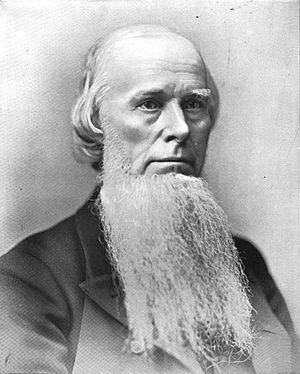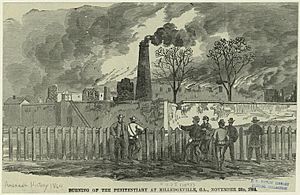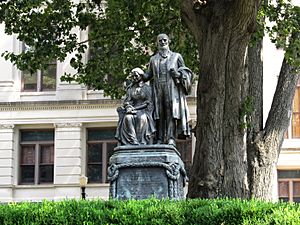Joseph E. Brown facts for kids
Quick facts for kids
Joseph Emerson Brown
|
|
|---|---|
 |
|
| United States Senator from Georgia |
|
| In office May 26, 1880 – March 3, 1891 |
|
| Preceded by | John B. Gordon |
| Succeeded by | John B. Gordon |
| Chief Justice of the Georgia Supreme Court | |
| In office 1868–1870 |
|
| Preceded by | Hiram B. Warner |
| Succeeded by | Osborne Augustus Lochrane |
| 42nd Governor of Georgia | |
| In office November 6, 1857 – June 17, 1865 |
|
| Preceded by | Herschel Johnson |
| Succeeded by | James Johnson |
| Personal details | |
| Born | April 15, 1821 Pickens, South Carolina, U.S. |
| Died | November 30, 1894 (aged 73) Atlanta, Georgia, U.S. |
| Political party | Whig, Democratic, Republican |
| Spouse | Elizabeth Grisham |
| Children | Joseph Mackey Brown |
| Education | Yale University |
| Profession | Lawyer, politician |
| Signature | |
Joseph Emerson Brown (born April 15, 1821 – died November 30, 1894) was an important American lawyer and politician. People often called him Joe Brown. He served as the 42nd Governor of Georgia from 1857 to 1865. He was the only governor to serve four terms in a row. Later, he became a U.S. Senator for Georgia from 1880 to 1891.
Brown was a strong supporter of slavery and the idea of states' rights (meaning states should have more power than the national government). In 1861, he was a key leader in Georgia's decision to leave the United States and join the Confederacy. However, he often disagreed with the Confederate government during the American Civil War. He didn't like the military draft and thought Georgia's soldiers should only defend Georgia. He also criticized Confederate President Jefferson Davis.
After the Civil War, Brown joined the Republican Party for a short time. He became the chief justice of the Georgia Supreme Court from 1865 to 1870. Later, he rejoined the Democratic Party. He became the president of the Western and Atlantic Railroad and earned a lot of money, becoming a millionaire by 1880. He used a system where prisoners worked in his coal mines. He was elected to the U.S. Senate twice, serving from 1880 to 1891. During this time, he was part of a group called the Bourbon Triumvirate with other Georgia politicians, John Brown Gordon and Alfred H. Colquitt.
Brown also helped the Southern Baptist Theological Seminary financially in the 1870s. A special teaching position was named after him there. However, in 2020, this position was removed because of Brown's views on slavery and his use of the prisoner labor system.
Contents
Early Life and Education
Joseph Emerson Brown was born on April 15, 1821, in Pickens County, South Carolina. His parents were Mackey Brown and Sally (Rice) Brown. When he was young, his family moved to Union County, Georgia.
In 1840, Brown decided he wanted to get an education. He traveled about 125 miles to an academy near Anderson, South Carolina. He traded his oxen for eight months of room and board at the school.
In 1844, Brown moved to Canton, Georgia. There, he became the headmaster (principal) of the town's school. He lived with a local businessman and minister named John W. Lewis. Brown paid for his stay by tutoring the Lewis children. Mr. Lewis became a good friend and loaned Brown money to study law.
Brown went to Yale University to study law. After finishing, he returned to Canton to start his law practice. In 1847, he opened his own law office. He soon made important connections that helped him become successful. He married Elizabeth Grisham, whose father was a big land developer. They had several children.
Brown joined the Democratic Party. He was quickly elected to the Georgia state senate in 1849. He became a leader in the party. In 1855, he was elected as a state circuit court judge. He also served as a presidential elector in 1856.
Governor of Georgia
First Term as Governor
In 1857, at just 36 years old, Joseph Brown was elected governor of Georgia. He believed that free public education for poor white children was important for the state's future. He asked the state government to use some of the money from the state-owned railroad, the Western and Atlantic Railroad, to help pay for schools. Many wealthy plantation owners did not support public education. They usually paid for private tutors or schools for their own children.
The Western and Atlantic Railroad was not managed well at first. It wasn't making enough money for Brown's education plan. In 1858, Governor Brown appointed John W. Lewis, his old landlord and friend, to run the railroad. Lewis was a good businessman. He quickly made changes that helped the railroad become profitable. In three years, the railroad started paying $400,000 a year into the state treasury.
Second Term and the Civil War
Brown easily won re-election in 1859. He defeated Warren Akin Sr. by a large margin.
Brown owned enslaved people. In 1850, he owned five slaves. By 1860, when he was governor, he owned 19 slaves and several farms in Cherokee County, Georgia.
After Abraham Lincoln was elected president in 1860, and South Carolina left the United States, Brown became a strong supporter of secession (leaving the Union). He worried that Lincoln would end slavery. Brown believed slavery was vital for the South's economy. He urged Georgians to oppose any efforts to abolish slavery. He said that if they didn't resist, slavery would be totally abolished.
Once the Confederacy was formed, Brown, who believed in states' rights, spoke out against the Confederate government gaining too much power. He especially criticized President Jefferson Davis. Brown tried to stop Georgia troops from leaving the state to fight in battles like the First Battle of Bull Run. He strongly disagreed with the Confederate government forcing people into the military (conscription). He also protested when the army took goods and enslaved people for their use. Other Confederate governors followed Brown's lead. This sometimes weakened the Confederate war effort.
Third Term and a Friendship
In 1861, Brown ran for re-election for a third term. Around this time, John Wood Lewis, the superintendent of the Western and Atlantic Railroad and Brown's old friend, decided to resign. The timing was difficult for Brown. He asked Lewis to keep his resignation a secret, but the letter was leaked to the news. This caused a disagreement between the two friends. Brown felt hurt, but they eventually made up. Governor Brown was re-elected. In April 1862, Brown appointed Lewis to a vacant seat in the Confederate Senate for Georgia.
Capture of Milledgeville
In 1864, after the fall of Atlanta, Union General William Tecumseh Sherman began his famous Sherman's March to the Sea. As Sherman's army approached Milledgeville, Georgia, which was then Georgia's capital, Governor Brown ordered Quartermaster General Ira Roe Foster to move the state records to safety. This was a difficult task because of the chaos.
After Atlanta fell, Brown pulled Georgia's state militia away from the Confederate forces. He wanted them to harvest crops for the state and the army. When Union troops under Sherman moved through much of Georgia in 1864, Brown called for the war to end.
After the Civil War
After the war, Brown was held briefly as a prisoner in Washington, D.C.. He supported President Andrew Johnson's plans for Reconstruction. For a while, he joined the Republican Party.
As a Republican, Brown was appointed as the chief justice of the Georgia Supreme Court. He served in this role from 1865 to 1870.
Rejoining the Democratic Party
Brown left his judge position when he was offered the presidency of the Western and Atlantic Railroad. In this job, Brown opposed efforts to set standard prices for shipping goods on different railroad lines in the state.
After Reconstruction ended, Brown rejoined the Democratic Party. In 1880, he was elected to the U.S. Senate by the state legislature. Soon after, Brown became the first Democratic official in Georgia to support public education for all white children. He suggested using railroad fees to help pay for these schools. Before this, only wealthy families could afford to educate their children with tutors or private schools.
Later Political and Business Career
Brown was first elected to the United States Senate by the state legislature in 1880. He started his term on May 26, 1880. He was re-elected in 1885. He retired in 1891 because of poor health.
Brown became very wealthy. While some of his supporters said he earned his money honestly, many of his businesses grew because of his political connections. He made a fortune partly by using a system where prisoners worked in his coal mines in Dade County. He used this system from 1874 until his death in 1894. This was a time when the system of using prisoner labor was very common in Georgia.
Under this system, state prisoners who could not pay fines for their crimes could be leased out by the state to work. In 1880, Brown's wealth was estimated at one million dollars. His Dade Coal Company earned $98,000 that year. By 1886, Dade Coal owned several other coal and iron companies. In 1889, it became the Georgia Mining, Manufacturing and Investment Company. This company largely relied on the labor of prisoners.
A committee from the state legislature visited Brown's mines the same year he sold them. They reported that the prisoners working there were in very bad condition. They were "actually being starved and have not sufficient clothing" and were "treated with great cruelty."
Death and Legacy
Joseph E. Brown died on November 30, 1894, in Atlanta. He was honored by having his body lie in state at the state capitol building.
His tombstone is in Oakland Cemetery. In 1928, a statue of Brown and his wife was placed on the grounds of the State Capitol.
His son, Joseph Mackey Brown, also became governor of Georgia twice.
Joseph E. Brown Hall at the University of Georgia in Athens is named after him. The building was finished in 1932.
Joseph Emerson Brown Park in Marietta, Georgia is also named for him.
The town of Emerson, Georgia, which uses his middle name, is named in his honor.
In Fiction
In her famous novel Gone with the Wind, Margaret Mitchell mentioned Governor Brown. She wrote about how "Joe Brown's Pets" were seen during General Sherman's march through Georgia in 1864. Brown had tried to keep Georgia's soldiers in the state for local defense. Mitchell wrote:
Yes, Governor Brown's darlings are likely to smell powder at last, and I imagine most of them will be much surprised. Certainly they never expected to see action. The Governor as good as promised them they wouldn't. Well, that's a good joke on them. They thought they had bomb proofs because the Governor stood up to even Jeff Davis and refused to send them to Virginia. Said they were needed for the defense of their state. Who'd have ever thought the war would come to their own back yard and they'd really have to defend their state?
See also
- American Civil War
- Ira Roe Foster- Confederate Quartermaster General of Georgia
Images for kids




